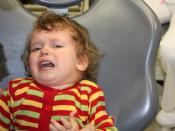Handling children's anger can be puzzling, draining, and distressing for adults. One of the major problems in dealing with anger in children is the angry feelings that are often stirred up in us. We need to remind ourselves that we were not always taught how to deal with anger as a fact of life during our own childhood. We were led to believe that to be angry was to be bad, and we were often made to feel guilty for expressing anger.
It will be easier to deal with children's anger if we get rid of this notion. Our goal is not to repress or destroy angry feelings in children or in ourselves but rather to accept the feelings and to help channel and direct them to constructive ends.
Parents and teachers must allow children to feel all their feelings. Adult skills can then be directed toward showing children acceptable ways of expressing their feelings.
Strong feelings cannot be denied, and angry outbursts should not always be viewed as a sign of serious problems; they should be recognized and treated with respect.
To respond effectively to overly aggressive behavior in children we need to have some ideas about what may have triggered an outburst. Anger may be a defense to avoid painful feelings; it may be associated with failure, low self-esteem, and feelings of isolation; or it may be related to anxiety about situations over which the child has no control.
Angry defiance may also be associated with feelings of dependency, and anger may be associated with sadness and depression. In childhood, anger and sadness are very close to one another, and it is important to remember that much of what an adult experiences as sadness is expressed by a child as anger.
Several points are important before we go...


